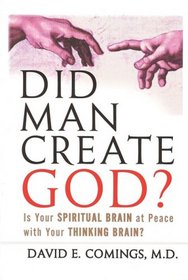Search -
Did Man Create God?: Is Your Spiritual Brain at Peace With Your Thinking Brain?
Did Man Create God Is Your Spiritual Brain at Peace With Your Thinking Brain
Author:
Unlike recent popular books that call for the end of faith and religion, this book by Dr. David Comings, an internationally renown physician, human geneticist and neuroscientist, proposes that spirituality is genetically hardwired into a specific part of the brain, is pleasurable, is critical to the evolution and survival of man, and will never ... more »
Author:
Unlike recent popular books that call for the end of faith and religion, this book by Dr. David Comings, an internationally renown physician, human geneticist and neuroscientist, proposes that spirituality is genetically hardwired into a specific part of the brain, is pleasurable, is critical to the evolution and survival of man, and will never ... more »
ISBN-13: 9781878267726
ISBN-10: 1878267728
Publication Date: 4/2/2008
Pages: 694
Edition: 1st
Rating: ?
ISBN-10: 1878267728
Publication Date: 4/2/2008
Pages: 694
Edition: 1st
Rating: ?
0 stars, based on 0 rating
Genres:
- Reference
- Religion & Spirituality >> Occult & Paranormal
- Christian Books & Bibles >> Theology >> Philosophy
- Religion & Spirituality >> Religious Studies >> Science & Religion
- Religion & Spirituality >> Worship & Devotion
- Science & Math >> Evolution
- Science & Math >> History & Philosophy
- Christian Books & Bibles >> Theology
- Nonfiction >> Philosophy >> Religious




